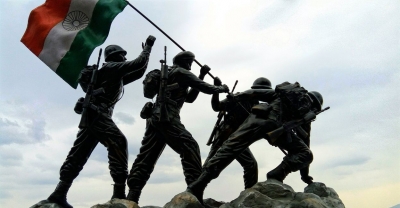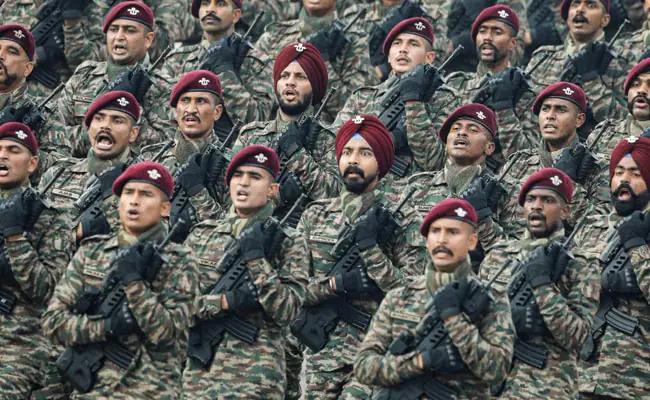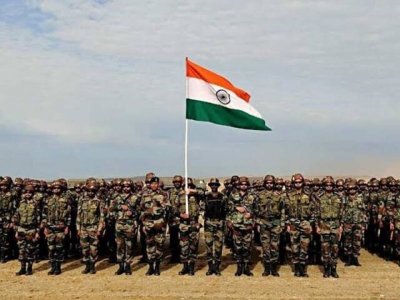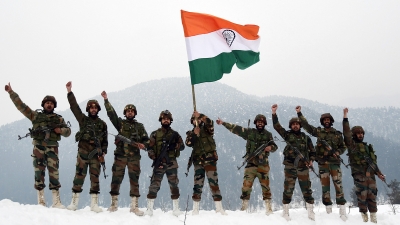
Join the navy, see the world!' I was very fascinated by this ad with images of an Indian naval ship and a sailor in a white uniform in the local newspapers in the year 1986. Those days, there was no internet and we would get to know about recruitment in the armed forces through recruitment rallies or ads. The selection process was robust; only the physically, mentally, medically and academically fit could get through.
Joining the Indian Navy was a dream come true for me. At first, my parents were against the idea as they knew that joining the armed forces was a risky affair and soldiers get killed during encounters and wars. Somehow I managed to convince them and I went for the recruitment rally and got selected.
Youngsters join the armed forces for different reasons; attracted by the uniform, promising career, the pay and perks, opportunities of travelling, the social prestige, to support their family, etc. But from the day we wear that prestigious uniform we all have just one reason; Service before Self. We forget all our differences of Let the religion, caste, creed, language, state and we proudly call ourselves the Indian Armed Forces (IAF). We learn to embrace the differences and live in harmony to serve our nation.
Of course, it requires a lot of sacrifice on our part as we join the armed forces at a very young age; service becomes our priority and everything else becomes secondary. While those of our age enjoy college life, we are getting grilled during our training. Of course, the rigorous training made us disciplined, courageous, confident, gritty and agile. Many a time, we didn't get leave when we wanted, we got transferred to places far from home every three years, and we had to leave our family behind and sail for months. Even while on leave, I was recalled a few times for operational requirements. Yes, it's definitely a Service before Self in every sense. We didn't have any employees unions or associations to call for a strike or fight for our rights; we just obeyed the orders from our superiors because that's how we were trained. I proudly served the Indian Navy for 15 long years as an Anti Submarine Warfare sailor and retired in 2002 in the rank of a Petty Officer. My career in the navy wasn't easy; it had its own challenges. I had to go through tough training, live with tough people and sail on rough seas. But after 20 years of retirement, when I look back, I take pride in having served our nation. The Navy transformed me from a boy to a disciplined, courageous, committed and responsible young man. It provided me with opportunities to visit several countries that I wouldn't even have thought of visiting at that young age.
I have great respect for our armed forces. Their sense of duty or a "calling to service" arises from patriotic family values or the desire to do something meaningful in life. The primary mission of the Indian Armed Forces is to ensure national security; to defend the nation from external aggression and internal threats, and to maintain peace and security within its borders. Apart from its wartime role, the forces are also actively involved in various peacetime roles; peace-keeping, humanitarian assistance, disaster-relief and aid to the local government in handling internal affairs, evacuation of Indian nationals from conflict zones and many more. The Indian Armed Forces has proven its strength and responsiveness during many such daredevil evacuations and operations.
If today we are able to sleep peacefully without the fear of being attacked by our neighbouring countries, we should thank the Indian Armed Forces who remain ready, vigilant, responsive and agile, safeguarding the borders from all fronts. It doesn't matter if the temperature is minus 50 degrees at the Siachen Glacier; the Indian Army stands tall and ready to strike. It doesn't matter if the sea is choppy; the Indian Navy is ready to sail out to deter the enemies. It doesn't matter if the sky is cloudy; the Indian Air Force is ready for surgical strikes if the enemies intrude into our air space.
Some countries have compulsory military service where every male has to serve the nation for a few years after their schooling. There are many reasons for such policies. By joining the armed forces for a duration of two years they become courageous, disciplined, patriotic and capable youth. It provides an opportunity to the youth who may be keen to don the uniform by attracting young talent from society. After having served the armed forces for two years these young men pursue their studies or find a job. Some men sign up as regulars and serve the nation for a long term. And when there is a need, these trained young men boldly stand to serve the nation by supporting our defence forces.
Recently, the Government of India announced the Agnipath scheme for recruitment of soldiers below the rank of commissioned officers into the three services of the armed forces. This scheme provides recruitment of youth between the ages of 17-and-half years to 23 years for four years with a provision to retain 25% of them for 15 more years. I believe that this would attract youngsters who dream of donning that proud uniform and have a firsthand experience of the Indian Armed Forces. At the same time, this short stint with the forces will certainly transform these youngsters into disciplined, confident, courageous and gritty citizens. Of course, if they prove their professionalism and commitment they have an option to serve further. The dividends of a short military service to the nation, society and the youth of the nation are immense. And if a need arises in the future, we will have a trained and disciplined civilian force to support the Indian Armed Forces, and of course, these young, trained soldiers can support in the peacetime role of the forces.
As we celebrate our 75th Independence Day, let's salute the Indian Armed Forces who have dedicated their life to the service of our nation. Let's also remember the thousands of armed forces personnel who have laid down their lives for the nation during war and peacetime operations. They have left behind their families, and we should respect and honour these war widows and children. Let's also help those who have retired after serving the nation to integrate back into society. Let's salute the serving Indian Armed Forces, because they deserve it!
Credit : Denny Joseph
Picture Credit : Google



